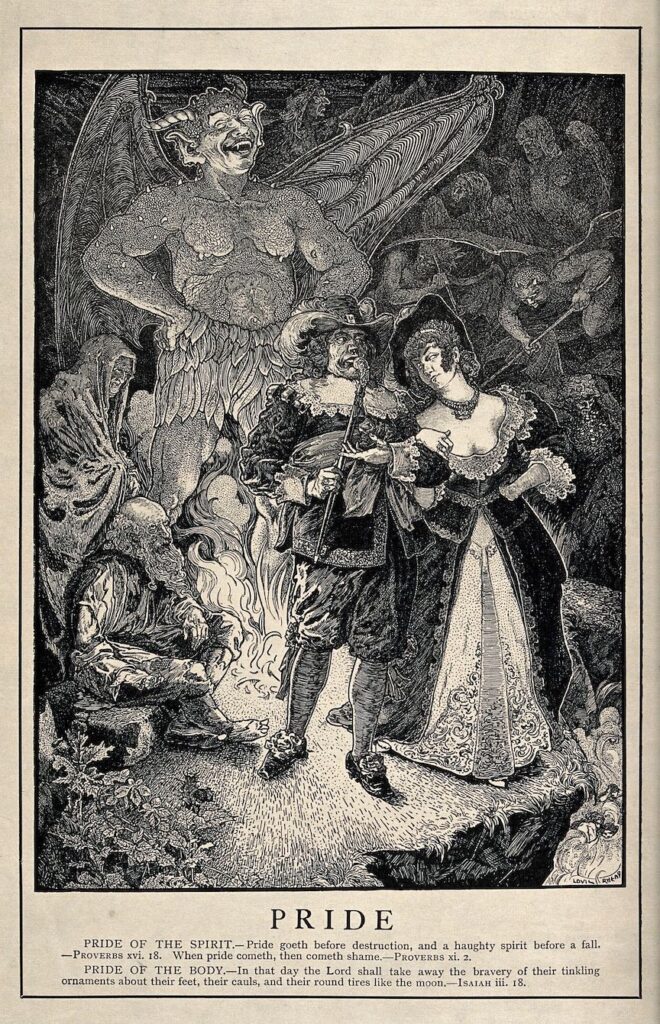I try not to get into political arguments, these days, but they are hard to avoid if one has any propensity to the truth. For in this age of prompt cancellation, one is likely to utter an offending word – quite a few words are potentially offensive – and the world may react in a quite touchy way. A sensible person tries to keep his mouth shut.
My recent word was, “Satanic.” I used it without thinking to describe the impulse behind the annual “Pride” demonstrations, in June. I said that I could forgive people for having homosexual impulses, for being even exhibitionist lesbians, gays, and whatever else through the LGBT alphabet. For this is just human infirmity, I argued. “Men” (by which I meant to include the rest) have been showing what traditionalists consider to be depravity through all times and cultures, though previously it was more discreet.
“But Pride is a Deadly Sin,” I continued. “To display public Pride in one’s sexual affiliation – even if it is cisgender and conventional – is Satanic. Rather than be Proud, all real and imaginary sexes should exhibit humility.”
My conversation was with a younger “gentleman” (i.e. a male), and for a moment I wondered whether the word might be new to him. For it may be banned by progressive educators, or in popular media. If it was withdrawn from the world’s vocabulary, we would have to find a replacement.
But no. Offense was taken. Curiously, I was told that I had violated an unwritten law, against the use of “hate speech.” Nothing should be “Satanic.”
Lucifer, the bringer of light, might lead Pride Parades – for they crave bright lights. I, on the other hand, prefer Noctifer, the corresponding bringer of evening darkness (according to Catullus), or Hesperus (according to Ovid). For “Luciferian” is synonymous with “Satanic.”
Among the Canaanites, before the Jews, there was Attar, the morning star, who attempted to dethrone Baal and, upon failing, descended into the underworld; in just the way Venus descends below the horizon. We Jews and Christians recall being cast out of God’s presence, in the Book of Genesis. This seems a universal meme. Or in Milton, Satan is cast out of Heaven, but declares that he would rather reign in Hell, than serve among the good angels.
Pride goeth before a fall, as the world formerly agreed. And while humility might be rare, among exhibitionists, it nevertheless makes for a quiet life, where most forms of cancellation are unnecessary.
Saint Luke saw Satan falling as lightning from Heaven. Among Latin Christians, Lucifer became the exponent of pride, and the very devil as history moved on. The father of lies, and of evil, is variously named over time, and described differently; but there is a family resemblance in the depictions.

That Lucifer was enlightened was the ingenious observation of the first Christians, and latter-day Jews. The announcement of sin is a function of enlightenment, and perhaps has always been in the West. With this goes the thrill of enthusiasm. In our time, “gay pride” is a feature of enlightenment, and a cause of enthusiasm, as is loudly declared through the megaphone of progressive politics. We carry the torch forward, on parade.
Well, I don’t, because I am a reactionary, avoiding the alarm of son-et-lumière. I try to resist the revolutionary impulse – which again I associate with Satan, Lucifer, or whatever we call him.
It is the secret, I think, of Satanic politics, and there is a secret within this secret, that must be grasped if we are to understand the power of myth. For though Satan is loose, and has become the chief “Influencer” in our realm, we are in fact not Satan. Perhaps we can be possessed by him, as slaves are possessed by a master, but the excitement he has caused will simply pass over, as it did for the Gerasene demoniac, and then for the Gadarene swine.
Intensities of light and waves of enthusiasm; loud proclamations, rioting, and push: these are the outward forms of the demonic. But they also reflect the inward form, of Satanic politics. They are human behavior at the opposite extreme from contentment. You should know this tree by its fruits.
For the world makes sense, and was designed to be good. When politics takes control of an event, there is inevitable progress towards disaster. For in politics, and by political tactics, man is trying to displace God. He, or we, propose to determine the outcome of the event; we are results-oriented. And the consequence is never the intended one.
Here I am saying that politics itself is essentially Satanic (or Luciferian, etc.). Similarly, I find all bureaucratic solutions – the creation of bureaucracies at each and every level of the political process – to be not merely “a necessary evil,” but necessarily an evil, that should be overcome. We are drowning in “political solutions,” miles (kilometers) deep.
Our challenge is to find what is not a political solution. The first step might be to disband the committee, but the second is to put what in its place?
My own humble suggestion is to try Godly freedom. We each are uniquely called, and in freedom may discern the still voice. By contrast, the tyranny of Satanic politics is apparent in every method that it employs. For the political solution is (not mostly, but invariably) to compel action; to make people do what they would not do if they were deciding for themselves. It is “change management,” as the politicians say.
Statistics, incidentally, are the mark of the Devil. This is made clear in Biblical teaching. We do not count numbers of persons or things, or perform a census, except with a plan to change things “for the better.”
Let me mention the old and glorious Catholic saw: “All change is for the worse, including change for the better.” For we believe that Jesus rules.
___________















